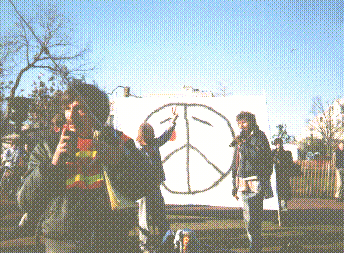Proposition One

ABOUT
CONSTITUTIONAL
CONVENTIONS
[Third of three papers by
Joseph Vigorito]
The idea of a constitutional convention sends some folks into a
panic that the "other side" in the political game might wipe out
the Bill of Rights. Not wishing to distract our natural allies
from the goals of Proposition One, currently the Committee is
focused on non-binding voter initiative campaigns, and urging
people to lobby Congress on DC Congresswoman Eleanor Holmes
Norton's proposed legislation, HR-3750, the "Nuclear Disarmament
and Economic Conversion Act." But should that fail, other
avenues may be open.
Reinventing our government so it serves life rather than death is
a daunting task, one that might well be worthy of the second
Constitutional Convention in the history of the U.S.
It should be noted here that while many states don't have
initiative procedures, all states have in their respective
constitutions the method of electing delegates to constitutional
convention, by dictate of Article V of the U.S. Constitution.
For states with neither voter initiatives nor responsive
politicians, Article V allows ordinary people to promote and
debate binding Constitutional law.
Article V splits the amendment procedure in two, 1) proposing
amendments and 2) ratifying amendments. Either Congress or
Constitutional Convention may propose a change to the
Constitution with either a vote of two-thirds in both houses or
by application of two-thirds of the states in convention.
Similarly an amendment becomes effective as part of the
Constitution when ratified by the legislatures of three-fourths
of states or by conventions in three-fourths of the states.
PROPOSING AMENDMENTS
"Article V provides that Congress, on the application of
two-thirds of the state legislatures, shall call a convention for
proposing amendments." l6 Am.Jur. 2d 333. The Supreme Court has
interpreted "shall" to mean "must" on this issue in Article V.
United States vs. Sprague, 282 US 7l6, 75 LEd 640, 7l ALR l38l.
Congress's job is "ministerial," or not a choice, in this matter.
"Under a state's constitution, it has been held that submission
of the question of convention or no convention to voters, and
election of delegates in case a majority of votes favor a
convention, would be valid, but that the calling of a convention
to pass on a proposed amendment without submitting the question
of convention or no convention to a vote would be invalid." Re
Opinions of Justices, 204 NC 806, l72 SE 474.
Need to Elect Your Own Delegates
Because of the Republican form of government and the restrictions
that lie in Article V, the only powers the people have are 1)
calling a convention and 2) electing delegates who will vote
correctly.
"(V)oters of the several states are excluded by terms of Article
V from direct participation in the process of amendment of the
Constitution. Their participation is restricted to voting for
delegates." l6 Am.Jur. 2nd 337.
Experienced and committed people, those who ran the successful
initiative petition campaign, should run as delegates. Don't
rely on talking incumbent politicians into your position. The
key factor is winning the initial election and being in the
majority.
Ratification by Convention
"The method of ratification by conventions in the states rather
than by state legislatures has been employed in the past (i.e.,
21st Amendment) and will probably be employed in the future." l6
Am.Jur. 2nd, Sec. 24, page 336.
"Article V is silent on how ratifying conventions should be
called or constituted, and there is no federal statute on the
matter, so that these matters are left to the states." Opinion
of Justices, l48 So l07.
It is within these state laws that control of the proposing and
ratifying conventions may be imposed. Procedures vary from state
to state the amount of time allowed for decision and the
campaigning required for election of delegates. Some states are
60 days, some 90, some l20 days. Other differences are in the
way candidate delegates may be arranged on the ballot.
"In one state the justices were of the opinion that delegates
must be elected from various localities within the state and not
at large, and not by a group system or party system by which the
voter would indicate his choice by a cross mark opposite a given
group. In another state it was held to be proper to require that
electors should vote for groups of delegates who are pledged to
vote at the convention as dictated by referendum." l6 Am.Jur.
336.
Therefore it can be seen that by winning the 1996 election in a
given state, that state would call for a special election to
choose delegates. By virtue of the majority position of the
electorate that had just voted for the Proposition One Amendment,
our committee in that state would be in good position to help the
voters pick the delegates that best fit the desires of the
majority.

